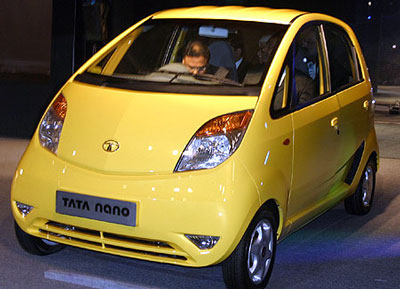Celebrating Failure (Intelligent Failure that is)
 The Tata Group is one of India's most successful and most admired companies. From its founding in 1868, the company has grown to encompass about 100 different corporate entities, and employs tens of thousands. The firm's business units make cars & trucks, steel, tea, electricity, chemicals, consulting services, software, and just about everything else. You have probably heard of its Nano automobile, the very innovative $2000 car (above). You may also remember that the company acquired Jaguar and Land Rover from Ford last year.Underlying the continuing success is a strategy of thoughtful management.This year, as it has for many years, Tata's internal innovation awards program, InnoVista, showcased numerous brilliant successes from throughout the company. It has also grown, from about 100 entries a few years ago, Innovista attracted 1700 entries in 2009.And it also featured something new this year. In addition to the awards for the most successful innovations, the company also gave awards to failures, under the rubric of "Dare to Try." What a wonderful way to encourage the spirit of innovation, and to let people know that risk is a part of the game, and it is not only tolerated, but celebrated!I had the opportunity to be on the panel for the final round of judging this year, and the quality of the ideas, and the people, was a great pleasure to experience. The judges had an enjoyably difficult time selecting from among the many fine projects that were presented.The following night, at the awards ceremony, many of Tata's senior leaders joined in giving out the statuettes to a few very happy teams. What followed, however, points out the difficulties with awards, as there are inevitably winners and losers, and the losers may be disheartened. More than a few approached me at the reception to ask why they had not won, and one poor fellow was so upset that his colleagues had to pry him away.Hopefully the enduring message that Tata employees will receive is about the value of innovation, and the necessity to try. This is the human part which is at the core of effective innovation, for it is at root a human process, and as with all things that we do, we bring our feelings and emotions to it. Managing the human aspect is critical, and while the InnoVista program is admirable for the human touch it brings, I continue to think about those who did win, and I'm wondering how to make them feel not like losers.If you would like to read more about the program, a short article was published in India's Economic Times, written by 2 senior Tata leaders (although they are not properly credited on the Times web site).There is also a good article and video from Business Week."Tata Innovista" will provide good search results in Google.
The Tata Group is one of India's most successful and most admired companies. From its founding in 1868, the company has grown to encompass about 100 different corporate entities, and employs tens of thousands. The firm's business units make cars & trucks, steel, tea, electricity, chemicals, consulting services, software, and just about everything else. You have probably heard of its Nano automobile, the very innovative $2000 car (above). You may also remember that the company acquired Jaguar and Land Rover from Ford last year.Underlying the continuing success is a strategy of thoughtful management.This year, as it has for many years, Tata's internal innovation awards program, InnoVista, showcased numerous brilliant successes from throughout the company. It has also grown, from about 100 entries a few years ago, Innovista attracted 1700 entries in 2009.And it also featured something new this year. In addition to the awards for the most successful innovations, the company also gave awards to failures, under the rubric of "Dare to Try." What a wonderful way to encourage the spirit of innovation, and to let people know that risk is a part of the game, and it is not only tolerated, but celebrated!I had the opportunity to be on the panel for the final round of judging this year, and the quality of the ideas, and the people, was a great pleasure to experience. The judges had an enjoyably difficult time selecting from among the many fine projects that were presented.The following night, at the awards ceremony, many of Tata's senior leaders joined in giving out the statuettes to a few very happy teams. What followed, however, points out the difficulties with awards, as there are inevitably winners and losers, and the losers may be disheartened. More than a few approached me at the reception to ask why they had not won, and one poor fellow was so upset that his colleagues had to pry him away.Hopefully the enduring message that Tata employees will receive is about the value of innovation, and the necessity to try. This is the human part which is at the core of effective innovation, for it is at root a human process, and as with all things that we do, we bring our feelings and emotions to it. Managing the human aspect is critical, and while the InnoVista program is admirable for the human touch it brings, I continue to think about those who did win, and I'm wondering how to make them feel not like losers.If you would like to read more about the program, a short article was published in India's Economic Times, written by 2 senior Tata leaders (although they are not properly credited on the Times web site).There is also a good article and video from Business Week."Tata Innovista" will provide good search results in Google.

